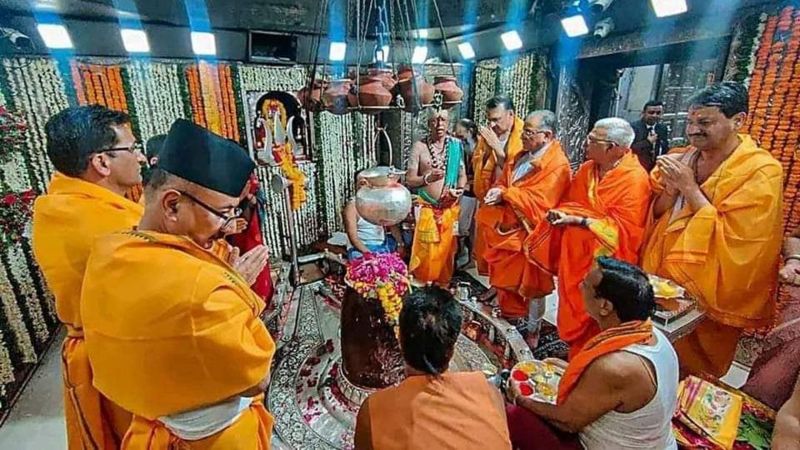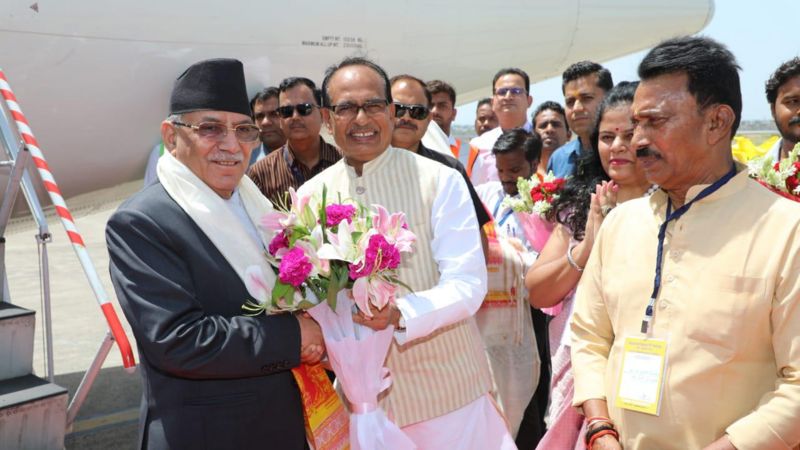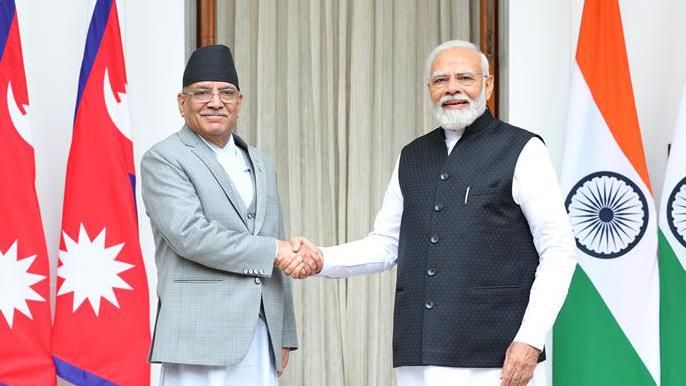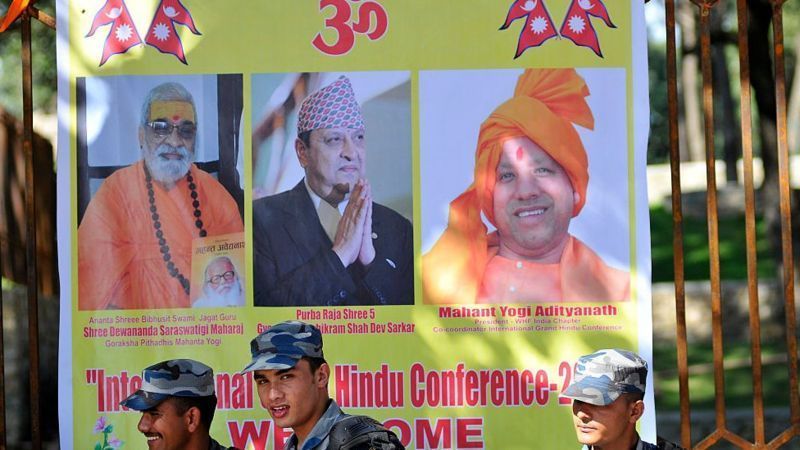Introduction
The political tensions between Nepal and India have been a longstanding issue, with both sides having had disputes over natural resources, territorial claims, and immigration. Despite efforts to improve relations, such as the Bhairahawa Summit in 2018, the relationship has been strained at times. One of the key factors in this has been the personalities and political agendas of the leaders involved. In particular, the relationship between Nepali politician and former rebel leader Prachanda and Indian Prime Minister Modi has been somewhat rocky. However, Prachanda's recent spiritual makeover may provide a new path forward in improving this relationship.
Prachanda's Spiritual Makeover
What is Prachanda's spiritual makeover? In recent years, Prachanda has become increasingly interested in spiritual practices, such as meditation, yoga, and Buddhist philosophy. He has even gone so far as to call himself a "rebel monk." This is a significant departure from his previous public persona as a militant communist, and has attracted both curiosity and criticism.
Why did Prachanda undergo this transformation? Some suggest that it is a personal quest for inner peace, while others believe it is a calculated political move to broaden his appeal to the Nepali public, the majority of whom are devout Hindus and Buddhists. Regardless of his motivations, the impact of Prachanda's spiritual beliefs on his political career could be significant.
Modi and Spirituality
How important is spirituality to Modi? Very. Modi is well-known for his interest in and dedication to yoga and other Hindu spiritual practices. He has even pushed for the global recognition of International Yoga Day. In his political platform, Modi often touches on spiritual themes, such as the importance of karma yoga (selfless service) and the idea of India as a spiritual leader.
Understanding Modi's spiritual beliefs is important in order to assess how his relationship with Prachanda might be impacted by the latter's spiritual makeover. Modi's spiritual connection to politics is rooted in his belief that spiritual practices can help individuals become better leaders, and that countries with strong spiritual traditions are more likely to be successful in their political and economic endeavors.
Relationship Between Prachanda and Modi
The history of the Nepali-Indian relationship is complex and multifaceted, but in the context of this article we will focus on the relationships between the leaders. Modi's relationship with previous Nepali leaders has been stronger than his current relationship with Prachanda. This is perhaps due to the fact that Prachanda is seen by some as anti-India due to his communist and nationalist leanings, as well as his past as a guerrilla fighter. However, the question remains: How could Prachanda's spiritual makeover affect his relationship with Modi?
Future of Nepali-Indian Relations
The potential effects of Prachanda's transformation on Nepali-Indian relations are varied. On one hand, it could improve the relationship due to the fact that Modi places great importance on spirituality and may respond positively to Prachanda's newfound interest in it. On the other hand, it may lead to skepticism or mistrust among Nepalis who see Prachanda's spiritual transformation as an attempt to pander to the majority Hindu and Buddhist population, rather than a genuine personal shift.
The role of spirituality in resolving political conflicts could be significant, as the practice of meditation and other spiritual practices have been shown to reduce stress, increase creativity, and improve communication skills. These positive changes could lead to more effective negotiations and conflict resolution.
Success Stories of Spiritual Leaders in Politics
There have been many notable spiritual leaders in politics throughout history, such as Nelson Mandela and Barack Obama. These leaders incorporated their spirituality into their political platforms in various ways. For example, Mandela used his Buddhist and African spiritual beliefs to promote reconciliation and forgiveness during South Africa's transition to democracy. Obama has spoken about his Christian faith and how it motivated him to pursue social justice.
The benefits of incorporating spirituality into politics include increased compassion and empathy, as well as improved decision making based on ethical principles. These qualities can be especially important in times of crisis, when leaders must make difficult decisions with far-reaching consequences.
Reactions to Prachanda's Spiritual Makeover
Public response to Prachanda's spiritual beliefs has been mixed. Some have praised him for his personal growth and the potential for positive change in Nepali politics. Others have criticized him for what they see as disingenuous pandering to voters. Political reactions to Prachanda's transformation have also been mixed, with some seeing it as a positive development and others questioning his motives.
The media has portrayed Prachanda's spiritual makeover in various ways, with some outlets portraying it as a genuine transformation and others as a political ploy. The challenges of combining spirituality and politics are manifold, and it remains to be seen how Prachanda's newfound interest in spirituality will impact his political career.
Spirituality and Political Change
The connection between spirituality and political change is complex and multifaceted. There have been cases of political change driven by spirituality, such as the Indian independence movement led by Mahatma Gandhi. In Nepal, the role of spirituality in driving political change has been less clear, but there is potential for it to play a role in the future.
Prachanda's Political Platform
Prachanda's previous political platforms have been rooted in Marxist and nationalist ideologies. It remains to be seen how his spiritual transformation will impact his platform, but there is potential for him to incorporate spiritual themes into his political message, such as promoting compassion and empathy in governance.
Spirituality and Social Justice
The connection between spirituality and social justice is an important one. Spiritual leaders throughout history have been key actors in social justice movements, such as Martin Luther King Jr. and the civil rights movement. In Nepal, Prachanda's spiritual beliefs could impact social justice and equality by promoting the idea of service and selflessness, and by instilling a sense of compassion and empathy among his followers.
Balancing Spirituality and Secularism
Maintaining secularism in government is an important goal, and it is essential that politicians ensure that their religious or spiritual beliefs do not conflict with this goal. There are also potential political consequences of heavily integrating spirituality into a political platform, such as alienating voters who do not share the same beliefs.
Can Religion and Politics be Separated?
The debate over the separation of religion and politics is a longstanding one, with arguments on both sides. Historical examples of religious integration into politics show that there can be benefits and drawbacks to total integration. It remains to be seen whether Prachanda's spiritual makeover will lead to greater integration of religion and politics in Nepal.
Case Study: Similarities and Differences Between Prachanda and Modi's Platforms
Comparing Prachanda and Modi's political platforms can provide insight into how their relationship may be impacted by Prachanda's spiritual transformation. While both leaders have discussed spirituality in their platforms, their approaches and beliefs differ. Modi's spiritual beliefs are rooted in Hinduism, while Prachanda's are more focused on Buddhist philosophy and meditation. The impact of Prachanda's spiritual transformation on his platform has yet to be seen.
Conclusion
The potential effects of Prachanda's spiritual makeover on his relationship with Modi and Nepali-Indian relations are varied, and it remains to be seen how this will play out in the coming years. However, the connection between spirituality and politics is an important one, and there is potential for it to play a positive role in resolving political conflicts and promoting social justice. The debate over the separation of religion and politics will continue, but by understanding the potential benefits and drawbacks of integrating spirituality into politics, we can work towards finding a balance that works for all.
FAQ
- What is spirituality?
- How does spirituality differ from religion?
- Can politicians really separate their personal beliefs from their political actions?
- Is Prachanda the only Nepali politician to integrate spirituality into his platform?
- Is there a future for spirituality in Nepali politics?







0 Comments